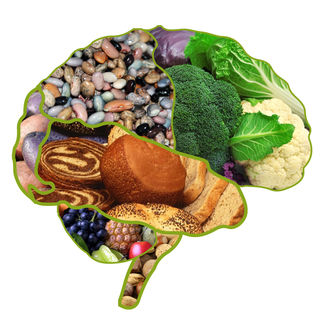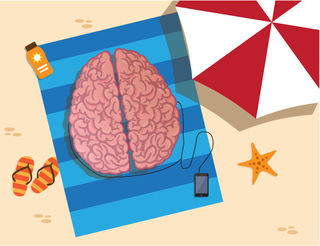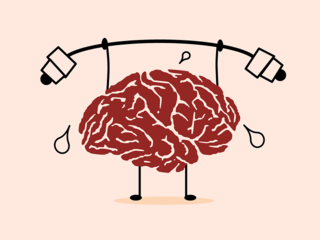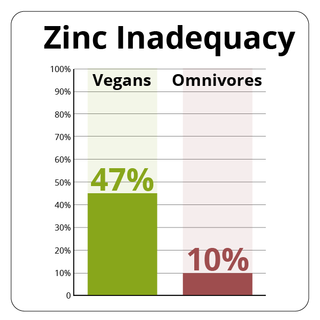Health
The Vegan Brain
Plant-based diets, micronutrients, and mental health
Posted September 30, 2017 Reviewed by Kaja Perina

Most people think of fruits and vegetables as teeming with the vitamins, minerals, and powerful antioxidants we need to live and thrive. It is true that many plant foods are rich in many of these substances, but just because a food contains a particular nutrient doesn’t mean we can access it. Unfortunately, plant nutrients often suffer from low “bioavailability”—which means that they are hard for us to extract, absorb, and utilize. The question then becomes: do vegetarian and vegan diets contain the micronutrients our brains need to function properly? Or do they put people at risk for serious deficiencies that increase the likelihood of developing psychiatric disorders?
Below I summarize the most important potential brain nutrient deficiencies that ALL plant-eaters—vegans, vegetarians and omnivores— need to be aware of, as well as key deficiency risks unique to vegans and vegetarians.
*Please note: this is a tailored version of a comprehensive post entitled Your Brain On Plants that contains additional information about scientific studies and complete references.
Vitamin A
Vitamin A is important to many aspects of brain function including vision, learning, and memory.
Contrary to popular belief, plant foods are lousy sources of vitamin A. In fact, they contain no vitamin A at all! Instead, they contain carotenoids, which we must then convert into retinol, the form of vitamin A our bodies can use. This is 12 to 24 times more difficult than obtaining retinol from animal foods. According to a 2013 review article in the Journal of Health, Population and Nutrition, this helps to explain why childhood blindness due to vitamin A deficiency is rampant in dozens of developing countries, particularly in Africa and South-East Asia:
“Poor bioavailability plays a predominant role in the development of [Vitamin A deficiency] among communities that mainly rely on plant-based foods.” [Akhtar S et al 2013 J Health Pop Nutr 31(4)]
Fortunately, vitamin A deficiency in the U.S. and other developed countries is very rare, due to the abundance of animal foods and because many processed foods are fortified.
Vitamin D
Vitamin D3 is important in brain growth and development, regulates calcium levels within the brain, helps protect brain cells from damaging oxidation, and supports the health of the hippocampus (the brain’s memory center).

The form of vitamin D our bodies need is vitamin D3 (cholecalciferol). We can make Vitamin D3 from sunshine or obtain it from animal foods. The form of vitamin D found in plant foods is vitamin D2 (ergocalciferol). Our bodies can convert some D2 to D3, but D2 is less potent, doesn’t last as long in the bloodstream, and may be harder to store in our body fat for rainy days and dark winters. If we spend enough time in the sun, we don’t need to obtain any vitamin D from our diet at all, yet many people (regardless of chosen diet) are deficient. Most studies have found that vegans have lower blood levels of vitamin D3 and are more likely to drop to deficient levels during winter months than omnivores.
Vitamin K2
When most people think of vitamin K they think of vitamin K1, which is abundant in many plant foods, but vitamin K2 is just as important and often overlooked. Vitamin K2 is confusing because it comes in many forms, but the essential form we need is called MK-4. In the brain, MK-4 is required to build critical cell membrane components called sphingolipids, as well as to support the overall health and function of brain cells.
The MK-4 form of vitamin K2 only exists in animal foods. The body can convert a little bit of K1 into MK-4, but not nearly enough to fully meet our needs. Therefore, savvy vegans turn to natto (fermented soy), which contains a bacterial form of vitamin K that our bodies can turn into MK-4 a little more easily. To learn more about vitamin K, please see Chris Masterjohn PhD’s Ultimate Vitamin K2 Resource. He recommends that vegans not rely solely on natto to meet their K2 requirements but rather take special supplements.
Vitamin B12 (Cobalamin)
Without this essential vitamin, the body cannot synthesize DNA, RNA, red blood cells, or myelin (the substance that wraps around and insulates our brain circuitry). Not surprisingly, B12 deficiency causes a whole host of serious psychiatric problems, including depression, psychosis, memory problems, mania, and changes in behavior or personality.
Vegan diets contain virtually no vitamin B12, and severe, prolonged B12 deficiency is fatal. Most vegans and vegetarians are aware of this danger and either take supplements or consume fortified yeast (unfortified yeast doesn’t naturally contain any vitamin B12). Unfortunately, deficiency is still far more common than it should be, with some studies finding that as many as 86% of adults (regardless of chosen diet) are deficient. Researchers report wide ranges of values, but overall, vegetarians tend to have lower B12 levels than omnivores, and vegans on average tend to have the lowest B12 levels.
Other B vitamins
Vitamin B1 (thiamin), B2 (riboflavin), B3 (niacin), B5 (pantothenic acid), B6 (pyridoxine), B7 (biotin) and B9 (folate) all work together to extract energy from food, build vital molecules, and regulate the metabolism of neurotransmitters such as serotonin. The brain is a high-energy organ, so even temporary, mild deficiencies of a single B vitamin can significantly disrupt normal brain function.
All of the B vitamins except for B12 can be found in plant foods, yet some studies find that vegans are more likely to be deficient in vitamin B3 (niacin), B6 (pyridoxine), and B2 (riboflavin).
Riboflavin seems to be the one that vegans need to pay the most attention to, as studies have more consistently shown higher risk of deficiency of this B vitamin in vegans compared to vegetarians and omnivores.
“Riboflavin deficiency is endemic in populations who exist on diets lacking dairy products and meat.” [Powers HJ Am J Clin Nutr 2003;77]
All three of these B vitamins can be found in plant foods, but often in smaller amounts than animal foods, so it can be challenging to obtain adequate amounts from a vegan diet unless great care is taken to include just the right mixture of foods.
Iodine
Lack of iodine, particularly in early life, stunts body and brain growth. Iodine is a required building block in thyroid hormone, which is critical in brain development and maintenance. Iodine deficiency affects two BILLION people, and is the most common preventable cause of intellectual disabilities in the world.
Most plant foods are quite low in iodine compared to many animal foods. Although vegans are generally more likely to have iodine deficiency compared to vegetarians and omnivores, iodine deficiency in the United States is uncommon due to the widespread use of iodized salt.
Iron

When people think of iron deficiency, they think of anemia (lower numbers of red blood cells in the circulation), but the truth is that the brain needs iron just as much as red blood cells do. Iron is required for neurotransmitter production (serotonin, dopamine and norepinephrine), generation of brain energy, hippocampal function (memory!), cell signaling, and infant brain development.
Many plant foods are lower in iron than animal foods, and to make matters worse, plants contain a form of iron that is far more difficult to absorb than heme iron, the form found in animal foods. Most vegans and vegetarians have about the same amount of iron in their blood as omnivores do, but their total body iron stores (how much they have in reserve) do tend to be lower.
Zinc
The brain requires zinc for serotonin synthesis, vitamin B6 activation, and cell signaling.

Plant foods are far lower in zinc than animal foods. Zinc deficiency is much more common among vegans than iron deficiency, and yet gets far less attention. A 2017 Swiss study found that 47% of vegans had inadequate zinc levels compared to only 10% of omnivores. Some clinical trials show that combining zinc supplements with antidepressants improves outcomes, and there’s even been one randomized controlled trial demonstrating that zinc supplements alone can reduce severity of depression symptoms.
Essential Omega-3 Fatty Acids: DHA and EPA
DHA and EPA are the forms of essential omega-3 fatty acids required for brain and immune system function. The brain is extremely rich in DHA, which is required to make myelin (the material that wraps around nerve cells, insulating brain circuits), and to keep cell membranes fluid and flexible enough to pass neurotransmitters back and forth. DHA is critical in the formation of healthy synapses (connections between brain cells), therefore infant brains require lots of DHA to develop properly. In short, DHA plays a “unique and indispensable role” in the “cohesive, organized neural signaling essential for higher intelligence” [Dyall SC 2015 Frontiers in Aging Neuroscience 7(52)].

Vegan diets contain absolutely no DHA or EPA, and vegetarian diets contain only small amounts from eggs and dairy. In comparison to omnivores, DHA and EPA levels can be about 30% lower in vegetarians and more than 50% lower in vegans. This is because the form of omega-3 (ALA) found in plant foods is very difficult for the body to convert into DHA. At best, women convert only about 9% of the ALA they consume into DHA, whereas men convert a dismal 0-4%.
The only veg-friendly supplements on the market that contain any EPA or DHA are those derived from algae. [Plant-sourced omega-3 supplements such as those from flax or chia contain ALA only]. Therefore, I strongly recommend that every vegan and vegetarian take an algae-sourced omega-3 supplement. DHA and EPA are hard to come by even in most omnivorous diets, because the foods that naturally contain them (oily fish, pastured animal fats/organs) are ones that people don’t eat much of these days, so many omnivores are deficient, too.
[Note: just as important as improving EPA and DHA intake is reducing the amount of omega-6 fatty acids in the diet, because omega-6 competes with omega-3s in the body. The best way to do this is by avoiding refined “vegetable oils” such as soybean, sunflower, and peanut oils, which are extremely high in omega-6 fatty acids. Please see my Fats page for more information.]
Do Vegans Have Low Brain Cholesterol?
We are often told that one advantage of a vegan diet is that all plant foods are naturally 100% cholesterol-free. Yet the brain (and indeed, every cell in the human body) requires cholesterol to function properly. Although the brain represents only 2% of total body weight, it contains 20% of the body’s cholesterol. Cholesterol is required for brain cell membrane structure and function, and is a vital component of myelin (brain cell insulation). This leads some to worry that vegans are at risk for low brain cholesterol, but is there really any cause for alarm?
This is a fascinating question with a surprising answer, so it has its very own post right here on Psychology Today: Low Brain Cholesterol: Separating Fact From Fiction, dedicated to the question of whether people who eat cholesterol-free diets or who take statin drugs to lower their cholesterol levels need to worry about low brain cholesterol.
Mind Your Micronutrients
In summary, the brain-healthy nutrients that plant-eaters in developed countries need to be the most concerned about are: DHA, vitamin B12, vitamin K2 (MK-4), zinc, iron, riboflavin, and vitamin D3. It is common knowledge that vegan diets need to be supplemented with B12, but many people are under the impression that colorful fruits and vegetables are excellent sources of most other vital nutrients. I practice at Smith College, where 4% of my students eat a vegan diet—that is twice the national average compared to other college campuses; the great majority of them cite compassion for animals or environmental concerns—not health—as their primary motivation. Many of the students I treat who choose a vegan diet only supplement B12, and some don’t take any supplements at all. The science is clear on this point: unsupplemented vegan diets pose great danger to brain health. It is my hope that this article will help call attention to these other critical nutrients the brain needs in order to operate at the top of its game.
*Please note: this is a tailored version of a comprehensive post entitled Your Brain On Plants, which includes information about plant antinutrients (phytic acid, tannins, oxalates, and goitrogens), scientific studies of nutrient deficiencies and psychiatric disorders, commentary, and complete references.




